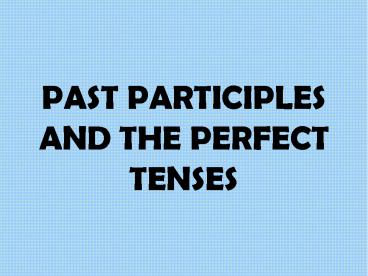PAST PARTICIPLES AND THE PERFECT TENSES PowerPoint PPT Presentation
Title: PAST PARTICIPLES AND THE PERFECT TENSES
1
PAST PARTICIPLES AND THE PERFECT TENSES
2
PAST PARTICIPLES
- Past participles are words like eaten,
fallen, found, arranged, left, denied - They are a verb form that can be used as an
adjective OR as part of a perfect tense
3
PAST PARTICIPLES
- In Spanish, past participles are formed by
dropping the -ar and adding ado, or the -er,
-ir and adding -ido - Examples
- comer (to eat)
- comido (eaten)
- hablar (to speak)
- hablado (spoken)
4
- More examples
- vender (to sell)
- vendido (sold)
- casar (to marry)
- casado (married)
- barrer (to sweep)
- barrido (swept)
- cansar (to tire, wear out)
- cansado (tired)
5
- Not ALL past participles are formed by adding
ado or ido. - Some are irregular!
- Do you know what past participles the following
verbs take? - abrir morir
- cubrir poner
- descubrir resolver
- decir romper
- hacer ver
- escribir volver
muerto puesto resuelto
roto visto vuelto
abierto cubierto descubierto
dicho hecho escrito
6
- PAST PARTICIPLES AS ADJECTIVES
7
- When past participles act as adjectives,
- they must agree with the noun they modify
- The house was sold. (vender)
- La casa fue vendida.
- Rebecca is tired in the morning. (cansar)
- Rebecca está cansada por la mañana.
- The light is turned off. (apagar)
- La luz está apagada.
8
El DVD debe ser rebobinado. (rebobinarto rewind)
9
Las vacas están usadas.
10
- Ahora te toca a ti!
- 1. The car was washed. (lavar)
- 2. The waitress was fired. (despedir)
- 3. The reserved room is mine. (reservar).
- 4. I have my plans arranged. (arreglar).
11
- 1. El coche fue lavado.
- 2. La mesera (camarera fue despedida.
- 3. La habitación reservada es mía.
- 4. Tengo mis planes arreglados.
12
- Now try the following irregular verbs. They STILL
must agree with the noun they modify - The broken window is your fault. (romper)
- La ventana rota es tu culpa.
- My grandparents are dead. (morir)
- Mis abuelos están muertos.
- The table is set. (poner)
- La mesa está puesta.
13
- PAST PARTICIPLES AS PART OF THE PERFECT TENSES
14
PERFECT TENSES
- In Spanish, a perfect tense just means
has/have/had done, for example I have eaten. - All perfect tenses are formed as follows
- HABER PAST PARTICIPLE
- (to have) (done)
15
- Present tense of HABER is as follows
- yo nosotros/as
- tú
- él, ella ellos, ellas,
- Ud. Uds.
- This is translated as I have done, you have
done, he has done, we have done, they have done
hemos han
he has ha
16
- Past tense of HABER is as follows
- yo nosotros/as
- tú
- él, ella ellos, ellas,
- Ud. Uds.
- This is translated as I had done, you had done,
he had done, we had done, they had done
había habías había
habíamos habían
17
- NEVER change the past participle when its part
of a perfect tense. Verbs dont have gender, only
nouns and adjectives.
18
- Examples
- I have traveled. (viajar)
- He viajado.
- I had traveled.
- Había viajado.
- We have returned. (volver) ojo!
- Hemos vuelto.
- They had fastened... (poner) ojo!
- Habían puesto.
19
But, how can I remember that the PERFECT tenses
mean to have done something?
20
(No Transcript)
21
OH, PERFECT! NOW YOUVE DONE IT!
- Get it? Perfect tense is you have done
something. This will help you remember what
perfect tense means!

